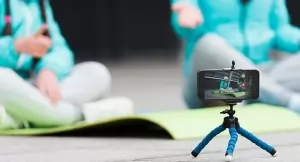How to effectively teach from home
Coronavirus has thrown us into a world of chaos and uncertainty. As a result of growing restrictions schools are having to figure out and adapt to new ways of delivering their pupils education.
We’ve put together some helpful tips you can follow if you find yourself suddenly becoming a virtual teacher.
Establish a work space
When working from home it’s important to differentiate home space from work space. This will help create a clear division between your work life and personal life.
Make sure your work space is light, airy and not cluttered. To avoid any unnecessary distractions whilst delivering online classes, keep your background plain and reduce any glares from windows by closing the curtains.
If space is limited don’t worry, you can still change the space around you. For example, having text books, pens, paper and worksheets on hand during work and then putting them away out of site when you finish work.
Plan ahead and test
Technology is vital for remote learning being successful, however using new technology for the first time can be daunting. Spend some time familiarising yourself with the new resources you’ll be using. Speak to other colleagues with their experiences and carry out a trial run to make sure any technical glitches are ironed out.
Decide as soon as possible who will be responsible for what types of IT support, and how they will be reachable by students, families, and staff. Make sure they all know how to reach out for support.
Give teachers, students, and families video and written instructions on how to use your platform so they can answer some of their own questions before reaching out for help.
Structure and schedule
Your school should provide with a timetable to follow and list of what topics to cover. However, if your school does not provide this then we would strongly recommend you create your own. This will help keep you in routine and help you to plan your work.
Pupils will also benefit from a structured day which has routine similar to how they would have had if they were learning in school.
A structure and schedule will also help draw the line between ‘work time’ and ‘personal time’ giving you a balance of them both. Include time for breaks so that your pupils and yourself have a break as you would in school.
Set expectations
Talk to your pupils and help them understand the new way of learning. Listen to their concerns, questions and reassure them. This will be just as daunting for them as it is for you. Tell them what you are expecting from them including homework, deadlines, time keeping and behaviour. Keep parents fully informed and make sure they are aware your expectations. You’ll need their contribution to make sure this works.
Let go of perfectionism
Virtual teaching is a new challenge for everyone, so try not to overcomplicate the work you are delivering. Don’t worry about the finer details or trying to make your slides all singing and dancing. When teaching online keeping things simple is key. This will help to avoid any technical glitches such as files not loading correctly or applications freezing.
Remember everyone will be using different types of devices i.e. desktop PC, laptops to tablets so it’s important this is taken into account.
Make it fun
No matter how old your students are, they will all appreciate from a bit of fun. Plan some time in during the day for quizzes, games and even throw in some meditation, yoga, or just quiet time to help them relax and prepare for what’s next. There are lots of online activities you can access and do a group. It will help them to release energy and prevent them from burning out.
Additional resources
Don’t try to do create everything yourself, use the array of online resources available. There are thousands of free projects, worksheets, educational videos, guides and audio clips you can download. Below are some of the popular online resources.
BBC Teach https://www.bbc.co.uk/teach
BBC Bitesize https://www.bbc.co.uk/bitesize
Twinkl https://www.twinkl.co.uk/
We Are Teachers https://www.weareteachers.com/
2 simple https://2simple.com/purple-mash/
Classroom secrets https://kids.classroomsecrets.co.uk/
iDEA https://idea.org.uk/about
History Learning Site https://www.historylearningsite.co.uk/
Find time for yourself to reflect and re-focus
Online learning is a new experience for you and your students. Make time for yourself to reflect on how the experience is going for you and for your students—but remember: you’re not expected to be perfect.
Ask yourself questions like:
- Are all the children engaged and focused?
- Are you able to deliver what you set out to do?
- What could I do to make learning more accessible, inclusive, and meaningful?
- How are we, as a class, doing physically, mentally, and emotionally?
It’s also worth asking colleagues to see how they are getting on with online teaching. Sharing ideas, tips and collaborating together will help to deliver a more effective education.
Tips on being top of the ‘class’
With the new academic term fully under way, for many teachers this period can be very stressful. With work/life balance has been highlighted as the biggest reasons why teachers are leaving the profession or even refraining from entering the profession. Being a teacher is one of the most rewarding professions and yes it does come with stress and pressure.However an exhausted teacher is no good to anyone, especially to yourself. Here are our top 10 tips on ensuring you remain as powerful and as best as you can be throughout the academic year.
1. Keep your to do list up to date
This is one of the biggest stress relievers and really helps you to plan and structure your week. Best of all it feels great to be super organised and tick off completed tasks!
2. Talk to other teachers and seek advice
A problem shared is a problem halved, so do not keep it to yourself. There are experts in the field who can help you. Make time to get to know other teachers and build yourself a network you can rely on.
3. Take one day at a time and take time to reflect
No Teaching role is the same, every class, every student and every school is different. It takes time to build up experience and know what methods work for you. Allow yourself to fail and learn, it is important you take time to reflect so you can improve yourself next time.
4. Communicate with parents
Getting parents on your side will be one of your biggest strengths. Parents love to be acknowledged, simply keeping them informed, engaged and even a simple smile will work wonders.
5. Respect and reward your students
Students will only respect you if you respect them. Positive recognition is known to encourage positive behaviour. When providing negative feedback always start with something positive to break the ice.
6. Keep it fun in the classroom
Learning is fun so make it fun! Decorate the classroom, crack a joke, start and finish the class with a song – whatever you do make it interactive. Your students will appreciate it and be motivated to come into your class.
7. Avoid negativity
Surround yourself with positive people. There will always be people who moan about work – simply avoid them! Negativity will drag you down and make you feel unhappy. Positive vibes will rub off on you so make sure you are around those.
8. Do not try to be perfect
Nobody is perfect and you will fail trying to be. Just be yourself.
9. Make time for yourself
You are a human being and we all need to recharge our batteries. It is great to plan something you can look forward to i.e. a holiday, cinema or a night out. If you find yourself having a tough day, go for a walk at lunch or read a book - do something to take your mind off work. Eating and sleeping well is crucial to the delivery of your work. Try not to go to bed with unfinished business on your mind. Your thoughts will race and your sleep is likely to suffer so get into the habit of writing down your worries before you go to bed.
10. Remember why you are doing the job
When the going gets tough remember you decided on a teaching a career in the first place. Keep special gifts you have been given, think about all the happy times you have had and the difference you have made to all your students. Always remember you are leading the class and you are the best person for the job. You can’t control everything, or everyone. Nonetheless, you can really excel at what you’re doing as long as you remember to make time for yourself and time to relax.
You’re doing a great job, keep it up!
New teacher guide
If you thought your PGCE was the toughest experience of your life, well, you’ve got a surprise in store for you – your first year as a newly qualified teacher will have you thinking twice about that idea.
Moving from academic life to a professional one will quite possibly be the hardest, most challenging period of your entire career as a teacher. The reality of working in a school is unlike anything you may have imagined and to say it is something of culture shock is putting it lightly. It’s like entering into a whole different world.
That’s not to say it is a ghastly experience, far from it. The satisfaction of teaching can be immediate and while you may find yourself shattered, stressed and under pressure, there is something of a counterbalance to that.
In delivering creative and engaging lessons that have a demonstrable and positive impact on your pupils, you may often find yourself heading home with a smile on your face, even a skip in your stride too.
This guide gives you an overview of how to get through the first 12 months of being a new teacher so that come next September, as the bell rings for the first class of the term, you feel relaxed, inspired and supremely confident.
Get to know your colleagues
The school environment is diverse when it comes to vocations, with a multitude of departments and roles beyond teaching. In light of that, in addition to getting to know your fellow teachers, introduce yourself to everyone and endeavour to build on these professional relationships over the course of the academic year.
This serves to one, make you visible to others and two, it allows you identify individuals who can help make your first year less demanding and nerve-racking. Although you may be exceptionally busy and curious to know how you can manipulate time – 24 hours is no longer enough – endeavour to attend staff socials. Consider it homework.
Plan, plan and then plan some more
Your experience of your PGCE is invaluable when it comes to coping with the sheer volume of work. Yes, the pace does increase significantly, and yes, the work appears two-fold to your study, but what you now have that you didn’t prior to your studies is knowledge and skill.
As you may have guessed, the secret to surviving, and indeed thriving, in a school is to plan, plan and plan. The more you know about your subject and teaching concepts, the more control you have over your lessons, the higher the chances of producing exciting and challenging lessons.
Embed reflection into your teaching practice
As you come to learn, reflection is a key feature of teaching. While at first you may have thought it was a tad prescriptive – i.e. doing it for the sake of doing it – it is hoped that you’ve come to appreciate the virtue behind the practice. It exists not as a bureaucratic means to an end – although it can feel that way – but as a methodology to boost and positively shape your teaching.
It is vital in the first year that you get into the habit of reflecting on your lessons and how it feels to teach because, in consulting academic texts and deliberating over various philosophies pertaining to education, you can make great strides in contextualising your emotions, as well as your direct experiences. This leads to action points, which expunge weaknesses and build on successes. Being a cyclical process, you keep progressing as a teacher. Reflection makes this more effective.
Deal with behavioural problems effectively
It is vital that early on you set a standard of expectation when it comes to pupil behaviour in the classroom so that your pupils know and understand when the line is crossed. This can be an extremely challenging part of the job, but with the right support and attitude, you can deal with issues extremely effectively.
Again, your PGCE will have exposed you to literature and guidance on this area, so go back to this and look over the material. Equally, consult your school’s own behaviour policy and speak to your colleagues about what strategies they use. And remember, managing challenging behaviour is not about punishing per se, it is about identifying and remedying underlying problems.
5 ways to use film creatively in lessons
There is a lot of debate in the teaching profession at all stages of education about the advantages and disadvantages of using film in class. However, on the whole, most professionals would agree that when used right, it can be an effective tool.
At the heart of using film – which here encompasses movies, documentaries, moving images and, well, anything posted on channels like YouTube and Vimeo – successfully is creativity.
There are certainly times where pressing play and letting students watch a film for an hour or so is the most effective approach, one that fulfils objectives and engages students, but that is just the start. Endless possibilities are achievable – you just have to be open to it.
This guide outlines how to be more inventive in the classroom when it comes to film. When properly utilised, anything can be possible. Film has, after all, the ability to provoke, inspire, confound and intrigue swiftly.
Create the right environment
A lot of teachers lose time and interest by struggling to connect various devices to the right wires and even when everything is hooked up, chances are something will go wrong. There will be no sound or the clip will have been lost and, what do you know, the DVD has been left home.
So, plan ahead and ensure that when it comes to pressing play, everything is in place. Invest in surround sound, consider a projector to ramp up the visuals and dim the lights. The right environment can transform the viewing experience significantly, and, it is worth noting, the "the wrong environment" can make it just as unpleasant.
Stop and start
This is applicable to videos that are long but warrant being watched in full. Find ideal "pause moments" to break up the activity. While the piece may be interesting, holding the attention span of your students is always a challenge. As such, stop and start, with each break being filled by a Q&A session or activity related to the film.
Get interactive
The sophistication and accessibility of video-making software - a lot of it free - is providing more people than ever before, young and old, with a richer vocabulary and expertise of how to shoot films.
Use this to your advantage. Take a poll to find out what apps/programmes your pupils use and then figure out a way of making the most out of it. For example, Vine is hugely popular, free and easily shareable. Make sure any films shot are in compliance with your safeguarding policies.
Set up a film club
While video is ubiquitous and one of the dominant forms of communication and culture in the 21st century, cultivating a real interest in the medium adds the kind of depth that is otherwise impossible unless your students are already aficionados.
Depending on what it is you're doing or what subject you're teaching, you ideally want all your students to benefit from extra-curricular activities of this ilk, otherwise you may create certain imbalances.
Think outside the box
You don't have to experience film within the confines of a classroom – take it further and explore other venues and spaces in which videos can be shown or broadcast. It's about thinking beyond the box.
For example, consider hiring out a local cinema or showing films outside. Utilise portable technology and create an experience that is fluid across multiple devices. You want students to feel inspired by film, not distracted by it.
Preparing for your first teaching interview
Does anyone actually enjoy being interviewed for a job they are keen on, you know, the kind of role that seems to make perfect sense personally and professionally, especially at the start of your career?
It's reasonable to assume that the answer to that question is a resolute no, the thought of it alone enough to make people feel ill at ease, as if they have just come down some illness.
Yet, c'est la vie, most of us will have to be interviewed for positions that are either functional – a part-time job that gets you by during college and university – or aspirational – a vocation that is more than just a livelihood.
Interviews are part and parcel of life, an event – for want of a better word – that is essential for helping employers and employees connect with one another in what is intended to be a near perfect fit. You win and they win.
If you have secured your first teaching interview, then you should be in a buoyant mood, confident in yourself because you've got momentum. The application process is, in itself, a very difficult part of the hiring process, so the fact that you have done enough to get noticed is laudable.
Now then, it's time to really impress. Our very specific guide offers you some tips about the kinds of questions you can expect when you're being interviewed for your first teaching role and the kinds of answers that will see you shine.
The usual interview dos and don'ts apply, but, in this instance, they don't really require any further explanation for this piece. Look smart, be polite and let you personality shine ... this job is yours for the taking.
Why do you want to be a teacher?
One of the classic questions that will, nine times out of ten, be asked at interview. Sincerity is paramount in your reply, as a stock response will be easily spotted by a seasoned headteacher.
Ultimately, what you want to get across is the fact that you enjoy a challenge, love working with young people, are enthusiastic about learning, passionate about education and want to dedicate your life to making a difference to other young people's lives.
Describe the kind of lessons you are keen on delivering?
This is one of those questions where your talents – supported by a quality mock lesson demonstration – get an opportunity to shine. Back up your suggestions – the more active, inclusive and differentiated, the better – with solid examples.
Other things to reference include how you'd get your pupils to be more reflective, what kinds of materials and tools you'd use and how you'd challenge and empower them.
How do you deal with challenging behaviour?
Heads are looking for you to show a shrewd, strategic and highly effective approach to resolving various incidents of challenging behaviour. It's one of those things that is unfortunately common in schools, so a sound awareness of the issues around various episodes and solutions is welcome.
If you have any examples of situations where you have successfully resolved a case of challenging behaviour, use it by way of support, otherwise go by best practice. This includes how to spot occurrences before they properly emerge, reinforcing the importance of good behaviour at all times and, when challenging behaviour is demonstrated, remaining in control and allowing pupils time to calm down.
What qualities should teachers have?
Think back to when you were a pupil and consider the qualities of the teachers you found to be inspiring. What was it about these individuals that made them stand out? Why were they so effective in making lessons fun and insightful?
Common qualities include possessing a personality, the kind that is approachable and authoritative (someone to talk to and someone you can respect); having a sense of humour; being fair; demonstrating a creative flair; and having the ability to make complex things easy to understand.
He is one of the most influential writers of all time, whose stories, especially his fairy tales, have established themselves as part of the very fabric of western culture. Whether it is The Little Mermaid, The Emperor's New Clothes or the Ugly Duckling, the collective works of Hans Christian Anderson have left an indelible mark.
The timeless stories have been passed down for many generations and reinterpreted and adapted with great enthusiasm and joy. As legacies go, the 19thcentury Danish author has done rather well.
Not only have his stories entertained children and adults alike, they have also enthused other authors, such as Alan Alexander Milne (Winnie the Poo) and Kenneth Grahame (Wind in the Willows), to delve deeper into their imagination. The world is certainly a richer place because of him.Milne (Winnie the Poo) and Kenneth Grahame (Wind in the Willows), to delve deeper into their imagination. The world is certainly a richer place because of him.
In celebration of his impact, the International Board on Books for Young People founded, in 1967, International Children's Book Day, to "inspire a love of reading and to call to attention to children's books".
It is held annually on Anderson's birthday (April 2nd) and ahead of this year's festivities, we've come up with some ideas on how to make the most of this at school with your primary school pupils.
Write your own short fairytale
Let your pupil's imagination run riot with this activity. The task is simple: write a fairytale within a defined period of time and share it with the rest of the class.
Provide your pupils with some key details. This includes the basic elements that make up a story:
- An obvious beginning (Once upon a time; Long ago ...)
- The world the characters find themselves has to be make-believe
- It contains characters that you don't find in the real world (ghouls, goblins, monsters, elves, dragons and trolls)
- The triumph of good over evil
- Good and bad characters
- A challenge to overcome
Read and tell the class
This is a fantastic activity that promotes comprehension, memory recall and communication skills and pushes youngsters out of their comfort zone. Get pupils to read very short story or chapter out of a book and then explain back to everyone what it was about. Get them to draw images onto a whiteboard as well, which is great for seeing how they visualise a story.
The chilled out reading corner
Ideal for the back end of the day, this chilled out activity is a nice way to wind down a busy day of reading fun. Get some treats in – healthy fruit and veg with a few naughty biscuits thrown in – lots of comfy cushions and seating, play some ambient music and get your pupils to spend some quality time with a book. Beyond just this celebratory day, invest in this kind of environment when getting your pupils to read. It's important because it underscores how pleasant reading is.
Design your own book cover
Another great activity for getting youngsters to think creatively, this involves you, the teacher, reading a story – maybe not that well known – and then challenging the class to come up with a cover and title. Afterwards, get everyone to pin their efforts on a board and have everyone spend some time looking at the images. Then, standing up next to the book covers, get them to talk about their ideas. At the end, reveal the cover and title and see what kind of response this results in.
4 ways to be more creative in lessons
The great twentieth century Spanish artist Pablo Picasso once said: "There are painters who transform the sun to a yellow spot, but there are others who with the help of their art and their intelligence transform a yellow spot into sun."
It's an eloquent line that captures, better than any definition could, the notion of what it is to be creative.
Moreover, it also expresses the power of creativity because, as anyone who has seen an original Picasso in person can testify to, the application of paint to a canvas in an imaginative and unique way has the power to move you. And, there is something majestic in that.
Creativity is vital in education. It excites, it engages, it inspires and it takes what is perhaps considered to be rather mundane and transforms it into something more engaging.
Everyone wins. Teachers feel empowered to re-imagine their subjects and offer new, distinct ways of passing on knowledge and skills. Students benefit from a better quality of education that not only challenges their preconceptions, but gets them to really engage in the learning process.
The significance of this cannot be underestimated because the state of being creative is all about going above and beyond what is required. As the French artist Henri Matisse and contemporary of Picasso once said: "Creativity takes courage."
In this guide we look at five ways in which teachers can transform the classrooms into creative hubs.
Take lessons out of the classroom
While the familiarity of a space offers you and your pupils a sense of safety, over the course of an academic year it can become quite formulaic. While teaching in the same space at the same time helps to instill a sense of order, it can become rather perfunctory.
Every now and again, break up the repetitive nature by changing the environment. Take your lesson outside, into another classroom or beyond the school gates. Contextualise what will ultimately be a trip with the lesson. Visit a museum, gallery or lab and bring to life your subject matter.
Always try to be active
One of the biggest concerns teachers have is ensuring that they communicate everything in their subject curriculum and this pressure can sometimes manifest itself in a didactic approach to teaching. In short, the focus is on teacher-led instruction.
While this approach has its place in education, it can nevertheless have a negative impact on students because ultimately they're passive partners in this style of teaching. Instead, get your pupils involved in their own learning through active exercises and regular discussions that do away with you standing at the front of a class.
Call in the experts
Whether it is a musician talking about their career in the industry or a scientist recounting an experiment gone wrong or a footballer talking about just how demanding their profession is, there is something special about learning from an expert.
The ability to relate what your pupils are learning to the real world is invaluable and moreover, it offers youngsters precious insight into what possible careers they can eventually end up in. It is often the case that students feel unsure about the relevance of what it is they're learning – this helps make sense of it.
Get your pupils to teach
It may sound like a bit of a copout but it is anything but. This approach is about empowerment and moreover, peer to peer learning can be a fun, engaging and effective way of learning.
Assemble your class into different teams and over the course of a term, get each one to run the lesson. You'll need to be involved to ensure they cover everything and fill in any gaps that may emerge, but, for the most part, you have to let them take charge. Out of this will come some innovative ideas to say the least.
5 ways to cope with stress as a teacher
Teaching is one of the most stressful vocations in the country, with high numbers of professionals admitting to feeling the heavy weight of their vocation on a daily basis or at least at some point in their career.
It’s a huge problem and one that is endemic in teaching. Seemingly, this has always been the case and therefore, given its prevalence, mustn't be overlooked. Schools need to adopt robust strategies for helping teachers with stress, otherwise they run the risk of perpetuating the same problems that makes it such a problem in the first place.
In this guide we look at some ideas that have been developed to tackle stress across the board (i.e. not just applicable to teachers), the levels of which in this country were described as “soaring” by a recent BBC investigation.
Identify what is making you stressed
Understanding the source of your disquiet helps you identify just what it is that is making you stressed. In turn, knowing what the trigger is helps you one, anticipate a problem and two, give you something to work towards.
Be more active
This may seem like it isn’t addressing the central problem, but studies have shown that the fitter and healthier you are, the more mentally alert and strong you will be. Additionally, while it won’t diminish stress in its entirety, it will reduce the severity of it.
Fight it head on
People feel a sense of weakness when admitting that they are stressed and will either shy away from it or think of it as a temporary state. This is counter-productive. You need to accept that it is an issue and moreover be adamant that you will work hard towards fighting it.
4 top tips for new teachers
Everything leading up to your first proper day as a teacher is challenging, exhausting and at times so difficult that you wonder what sort of daze you were in when you sat down and applied to gain a qualification in the profession.
Yet, as you arrive into your school, on the back of having successfully made it through teacher training, the application process and the interviews, you feel a slight pang of unease, a rumble of sorts in the belly, a brief stutter in your confident stride.
The reality hits you. This is it; the next step, the beginning of a new chapter, a whole new way of working and living. It’s not easy, but with our guide, you can rest-assured that as the bell rings and your pupils settle into the seats, by the time you’ve told them your name, you’ll be more than ready to make a positive difference.
Be the best teacher you can be
Without quite knowing it, children and young people have high expectations not just for new teachers who are starting out, but any teacher they come across for the first time during their entire experience of education. Live up to this - in fact go further.
Now, of course, you’re certainly not going to win any fans after one class, but, if you consistently exceed what they expect, through quality, engaging and creative teaching, you’re well on your way to being the best teacher you can be.
Be a master of your subject
The likelihood is that the subject you’ve chosen to teach is one you are passionate about, knowledgeable of and skilled in. Sure, there are some teachers who opt for a subject that they are good at, but if they are lacking the previous attributes, something is always going to be missing.
In which case, keep on top of new developments in your field, analyse the latest reports, engage with key figures, read new books and never stop asking questions. The deeper and more comprehensive your understanding and abilities are, the more students will get out of it.
Assess your work with reflection and feedback
The only way we’re ever going to learn is to pick up on positive and negative patterns - ask yourself, for example, why one particular lesson always goes down well or why a certain subject, told a certain way leads to apathy?
Through regular assessment - using your own reflective model - and pupil feedback, you can gather the data needed to analyse the good, the bad and even the ugly. Make time for this and you’ll notice things that you’ve previously overlooked or misunderstood.
Get to know your students
This is easier said than done but knowing your students as human beings helps you tailor your teaching, while also giving you insight into their character. You spend a lot of time working with them, after all, so it pays to be informed.
Moreover, you will be more adept at pushing them to go further at the right time, while also supporting them so that even when they’re struggling, they still possess the resolve, the character to succeed. You can’t do this if you don’t really know your students.
For most people who have trained as a teacher, one of the most exciting things in their career will be the moment they can at long last leave the classroom and head...straight back into a classroom, but this time as the person leading lessons and taking charge.
The first year can be the trickiest of all to master, however, and for teachers taking on their first class, it can be a matter of survival of the fittest and being strong willed. Here, we take a look at a few of the top tips for surviving your first year as a teacher.
Set the rules
You probably want your class to like you, especially if you're a brand new teacher, but kids seem to be able to sense weakness, and you don't want them to think you're a pushover. It's always a good idea to start your first lesson by setting out a few ground rules. It lets the class know who's in charge, and establishes you as the authority figure.
Never stop learning
In your first year in particular, you should remember that you never stop learning. You'll be surrounded by far more experienced teachers with a wealth of knowledge you could never get at university, so never be afraid to ask for help and advice from those who have it in plentiful supply.
Don't be afraid to fail
There's scarcely a time in life when everything goes right for anyone, and it's no different when you're teaching. In your first year, you may feel a tendency to play it safe, but remember, there's no reason to be afraid of failure, and you should always try things out. If they don't work, call it a lesson learned.
Know when to turn off
One of the biggest barriers to retention in teaching is stress. People will get themselves so worked up over getting everything done that they work too much and end up falling out of love with teaching. Remember that you need a good work-life balance to enjoy a good life in general, and know when to switch off. Don't overwork yourself, and don't be afraid to ask for help when your workload gets too heavy.
Be yourself
You may know what sort of teacher you want to be, but you should never portray a personality that's not true to yourself. Your class will see right through it, and you'll never feel comfortable in this situation. Try to be yourself and just relax and you'll find lessons flow better and you'll enjoy your job far more than you would otherwise.
Don't take it personally
Kids say things they don't mean all the time, and if someone in your class says they don't like you, it's important not to take this too seriously. Remember that kids are always trying to push boundaries and test authority with their behaviour, and if they are misbehaving or insulting you, it's rarely, if ever, personal. Just try to stay calm and do your best to resolve situations in a calm manner and you'll find you get the respect of the kids you deal with far easier.















